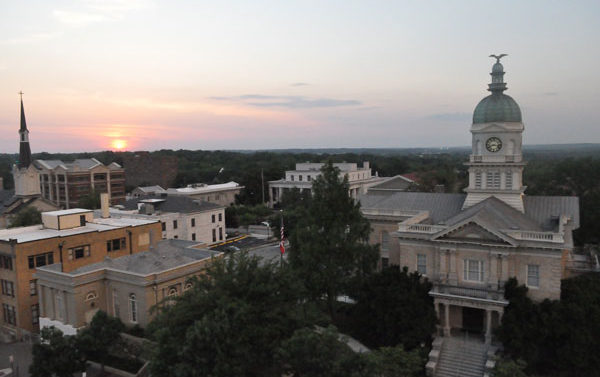Vitals
Area: About 122 square miles.
Elevation: 784 ft. (Athens Ben Epps Airport)
Latitude: 33°57’N (About the same as Los Angeles)
Longitude: 83°23’W (About the same as Flint, MI)
Average High Temperature: 51.6°F (January), 89.6°F (July)
Average Low Temperature: 32°F (January), 69.5°F (July)
Average Precipitation: 49.74 inches per year
Population Including Students: 116,714 (2010 Census)
UGA Enrollment: 33,760 (Fall 2010)
History
The University of Georgia was chartered in 1785 but wasn’t sited for 16 years because of the Georgia-Creek Indian War, which broke out in 1786.
The city of Athens was incorporated in 1806. By the 1820s and ’30s, it was home not only to thriving textile mills along the Oconee River, but to numerous antebellum mansions that sprouted up around the university.
Athens became the seat of Clarke County in 1872, and the city continued to grow. By the end of the 19th century it had streetcars, suburbs (now urban neighborhoods like Cobbham and Boulevard) and public schools. The streetcars, sorry to say, are long gone.
The University of Georgia was racially integrated in 1961 with the enrollment of Hamilton Holmes and Charlayne Hunter.
Beginning in the late 1970s, Athens became internationally known for its uncannily rich music scene, which over the ensuing decades has spawned and sustained such renowned and diverse artists as R.E.M., The B-52s, Widespread Panic, Vic Chesnutt, The Olivia Tremor Control, of Montreal and Drive-By Truckers. Yes, that leaves out some big ones—any list would.
The Athens and Clarke County governments were unified in 1991; that’s why we call it “Athens-Clarke County.”
Government
The Athens-Clarke County Unified Government has an elected mayor and 10 commissioners representing eight geographical districts and two superdistricts composed of four of the geographical districts. The mayor and commission appoint a manager who oversees the daily operation of the government, including the staff of 39 departments. Local elections are nonpartisan; Democratic and Republican primaries are held only for state and federal offices.
You can find out about government departments, services and meetings, elected officials, and more at the ACC website, www.athensclarkecounty.com. You can also use the website to sign up to be notified of almost anything the government does by following the “E-Newsletters” link on the home page.
The Athens Regional Library System serves ACC as well as Oconee, Oglethorpe, Madison and Franklin counties. Its main branch and headquarters is the Athens-Clarke County Library at 2025 Baxter St., which is an outstanding and ever-improving resource for this community. Go to www.clarke.public.lib.ga.us to learn about locations, services, special events and more.
State & Federal: Athens-Clarke County is divided among Georgia House districts 113, 114 and 115, and between Georgia Senate districts 46 and 47. It is located within Georgia U.S. House District 10.
Welcome Centers
Athens Welcome Center: 280 E. Dougherty St., (706) 353-1820, www.VisitAthensGA.com
UGA Visitors Center: College Station Road at River Road, (706) 542-0842, www.visituga.edu
Athens Convention & Visitors Bureau: 300 N. Thomas St., (706) 357-4430, www.visitathens.com
Oconee County Welcome Center: 22 N. Main St. Bldg. B, Watkinsville; (706) 769-5197, www.visitoconee.com
What’s Where
Downtown: The commercial and cultural heart of Athens. Whether you’re looking for shopping, eating, drinking or other entertainment, it’s all richly concentrated here.
UGA Campus: Stretching far out from the southern border of downtown at Broad Street (with the historic Arch at the foot of College Avenue serving as its symbolic gateway), this is one of the oldest, most beautiful—and rapidly growing—campuses in the country.
Boulevard/Cobbham: Straddling Prince Avenue, a commercial corridor to the west-northwest of downtown, are Athens’ original “streetcar suburbs,” now lovingly preserved intown historic districts full of grand 19th- and early 20th-century homes. The Boulevard itself is wide and stately, while Cobb and Hill streets are cozier but no less impressive.
Normaltown: A little farther out Prince you’ll reach this diverse little pocket, which is adjacent to the Sunset and Buena Vista neighborhoods as well as Boulevard and Cobbham. Normaltown’s homes (at least its older ones) are more modestly scaled than the ones in Boulevard and Cobbham, but it boasts a thriving little commercial strip of shops and restaurants. It was named for the State Normal School, which opened in the 1890s as a teachers’ training college and served most recently as the U.S. Naval Supply Corps School; it was taken over by UGA last year and is in the process of being converted for use as the new Health Sciences Campus.
Five Points: Split by Milledge Avenue and nestled along the western edge of South Campus, this big, upscale residential neighborhood is home to some of Athens’ wealthiest residents as well as some of its hardest-partying students. The heart of Five Points is the intersection where Milledge meets Lumpkin Street and Milledge Circle amid a well-established collection of restaurants and shops—even a grocery store.
Eastside: This is shorthand for an entire, huge quadrant of the town, which includes numerous residential neighborhoods and busy commercial districts, but is more sprawling and less walkable than the older neighborhoods described above. Exceptions to that caveat are the Chicopee-Dudley and Carr’s Hill neighborhoods, located to the north and south of Oconee/Oak Street, respectively, just east of downtown.
Baxter Street/Broad Street/Atlanta Highway: The Baxter and Broad commercial corridors run parallel straight west of campus and downtown and are linked about a mile out by Alps Road, which separates the Alps and Beechwood shopping centers. West of Alps (which, north of Broad, becomes Hawthorne Avenue, a longer, narrower commercial vein), Broad Street becomes the Atlanta Highway. If you’re looking for grocery stores, car dealerships and big box retail outlets, that’s where to find them; it’s also the way to the Georgia Square Mall, just outside the Perimeter.
You and the Law
Smoking: You can’t smoke inside, anytime, in any public building (yes, that means bars), or in public parks, either.
Drinking: You can’t have an open container of alcohol on any public right-of-way unless you’re inside the boundaries of a sidewalk cafe. Exceptions? When you’re on the UGA campus on the day of a football game, or if you’re in a limo. You can’t buy alcohol at stores on Sunday, at least for now—the Georgia Legislature recently legalized referendums on Sunday sales, so we’ll likely have one by November 2012 at the latest. Bars are closed Sundays, too (again, for now), but restaurants that make more than half their money on food are allowed to serve drinks.
Bikes: Bicyclists have to follow the same rules as cars—aside from that, be polite and be careful (and wear a helmet—it’s not the law, but it’s a good idea). Also, you can’t ride on the sidewalk unless you’re 12 or under, and not even then if you’re downtown.
Littering: Don’t. It’s illegal.
Cohabitation: It’s illegal for more than two unrelated people to live in a single dwelling unit, like an apartment or a house—even a big house.
Cameras: There are cameras downtown that are monitored by the police, and that are recording your every move. Be aware of that.
Help Out!
Volunteer: HandsOn Northeast Georgia is basically a clearinghouse that connects those who wish to do volunteer work in the community with Athens’ many nonprofit organizations. Check out your options at www.handsonnortheastgeorgia.org and the Help Out section of Flagpole’s weekly Bulletin Board pages.
Recycle: Athens-Clarke County has sidewalk receptacles and curbside pickup for recycling, but it’s up to you to use them. That will become easier in autumn 2011, when ACC makes the leap to “single-stream” recycling, meaning you’ll be able to place all recyclables into the same receptacle, rather than separating paper from other materials. The county facility takes most paper, glass bottles and aluminum, as well as plastic items with the “1” and “2” labeling codes: pretty much anything with a screw-on cap. Unfortunately, that doesn’t include plastic cups, plates or cutlery, or paper cups. For complete information on what is and isn’t accepted, as well as where to take hard-to-recycle items like batteries and electronics, check out www.acc-recycle.org.
Getting Around
Athens Transit: Buses run hourly or more frequently, Monday–Saturday, generally from about 6 a.m.–10 p.m., depending on the route. UGA students, faculty and staff ride free with IDs. Buses have bike racks, too. Maps, timetables, real-time GPS tracking and more are available at www.athenstransit.com, or call (706) 613-3430.
Campus Transit: Much more frequent but with a smaller coverage area, the numerous UGA routes are officially open to all citizens to ride. Maps and more at www.transit.uga.edu.
Southeastern Stages: Operates daily inter-city bus service to Atlanta, the Carolinas and beyond; its station is downtown at 220 W. Broad St. Call (706) 549-2255. www.southeasternstages.com
Rail: The nearest Amtrak station is in Gainesville, with the next closest in Atlanta. Both are stops on the Crescent line between New York and New Orleans. Call 800-USA-RAIL or go to www.amtrak.com.
Air: There are two shuttle flights a day from Athens’ Ben Epps Field to both Atlanta and Macon. Call (706) 613-3420 for flight information or go to www.athensairport.net. One caveat: if you’re trying to make a connecting flight, allow yourself some buffer time if possible—delays and cancellations can happen.
Shuttle: Groome Transportation runs a full schedule of shuttle vans from various stops in Athens to Hartsfield-Jackson International Airport daily. Call 800-896-9928 or go to www.groometransportation.com.
Car: The roads in Athens are pretty smooth, so you can probably get by without an S.U.V. or giant pickup unless you’re hauling a bunch of stuff around with you all the time. Downtown metered parking is 75 cents an hour, with two-hour time limits from 8 a.m.–6 p.m. (you have to feed the meters until 10, but the time limit ends at six). There are also several parking decks downtown that cost $1.50 per hour, with no time limit. You can get more details on downtown parking at www.downtownathensga.com. You should also know that most surface lots downtown are operated at night by Prestige Parking, which charges $5 and will tow you if you “forget” to pay.
Taxi: If you’re out drinking, it’s a good idea to take a cab home. There are a bunch of companies in the phone book (hint: load a few into your cell!), or you can usually catch one downtown in front of the UGA Arch on Broad Street late at night. And be aware that if you’re catching a cab home from downtown at bar-closing time, you likely won’t be the only passenger, or the only stop. The cabs are large vans which tend to fill up, so your route home may be less than direct.
Bike: You can bike just about anywhere and everywhere in Athens, but riding onto campus is an especially good idea. Seriously, driving on the UGA campus is awful, parking is expensive and scarce, and biking there is quick, easy and a pleasure. For all your local biking needs, look to BikeAthens, whose bike map, available around town and at www.bikeathens.com, is only one of the many excellent resources they have to offer.
Hoof It: Oh, yeah, you can walk just about anywhere, too. You know you love it—do it.
UGA
The Campus: Athens was built around what we now call North Campus; it’s the oldest and, in some ways, most beautiful part of the city. Don’t let the high iron fence put you off: the university belongs to you and it’s perfectly appropriate to use it like a public park (provided you tend to use parks responsibly and considerately), whether you have “official” status there or not.
Information: What’s more, the UGA Libraries (there are many of them) are an excellent resource for non-students and the campus community alike. You can wander in, or go to www.libs.uga.edu.
Entertainment: UGA has departments of theatre, film, dance, music, visual arts and more. All of them are essentially machines for producing and showcasing cultural events and artifacts, and they really want you to share in these things. Pay close attention to the Flagpole Calendar to stay in the know.
Ideas: In addition to fine and performing arts events, the university is constantly hosting lectures, seminars, workshops and readings—many of them free and open to the public—by both local and visiting academics and writers. Again, keep an eye on the Flagpole Calendar.
Sport: While the high-profile student sports—football, basketball (men’s and women’s), baseball and gymnastics—charge for tickets, all the others—from tennis to swimming to women’s softball and soccer—are free. Visit www.georgiadogs.com.
Parking: A good rule of thumb to follow is that, if you drive onto campus, you can only park in a deck. Most surface lots are permit-only (you know who you are, and aren’t), and rules are strictly enforced with high ticket fees and towing. Be prepared: call (706) 542-PARK or go to www.parking.uga.edu.
Online Resources
ACC Website (www.athensclarkecounty.com): The recently revamped unified government website has an up-to-date calendar of events, advance meeting agendas, archived video and minutes of meetings, mayor and commission info, contacts for all departments and much, much more. You can also sign up there to receive “E-Newsletters,” which will notify you of pretty much anything the government is doing.
University of Georgia Libraries Athens-Clarke County Guide (www.libs.uga.edu/athens): A sprawling collection of links, archives, maps, publications and pretty much anything you might need to get familiar with the town and the area. A wonderful time-filler.
Like what you just read? Support Flagpole by making a donation today. Every dollar you give helps fund our ongoing mission to provide Athens with quality, independent journalism.











